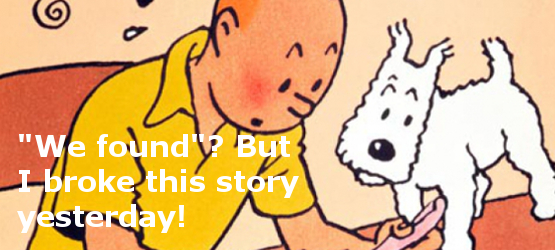While a lot of people might envy games journalists for being paid to play and talk about games, very few actually respect the profession. And they are right. More than any other sector of journalism, sites routinely don’t source or miss-source, something that fundamentally damages any hope the industry has at growing and becoming more aggressive with investigative journalism.
Now, before I start, I’ll admit PSLS has probably missed a few sources in its lifetime, as mistakes do happen. We’re not perfect, but any mistakes were just that, we have never intentionally not sourced, or miss-sourced.
What Sourcing is, Why it Matters to Sites:
First off, it’s important to note what sourcing is – it’s where one site credits another in the form of a hyperlink. There are two different kinds of sourcing – where the content is directly taken from the original post (e.g. an interview, video or exclusive game reveal) or where a site has found something publicly available (e.g. a job listing or a patent) but the other site gives them credit for the hard work, noting the original site that made the discovery. In other forms of journalism, both sourcing types are expected to be followed – especially in print.
So why should the original site really care about whether they get linkage? Sites obviously need traffic to grow an audience and pay for server bills, and widespread linkage is exactly how that happens. There’s the immediate benefit of people clicking through on the link, or people seeing the name on several scoops and checking it out, but there’s also something far more important – Google ranking. As you know, Google is most internet user’s portal to the world wide web, so it’s also generally the main way sites receive traffic. The higher a site is on a search for a keyword like ‘PlayStation’, the more visitors they will receive. So how does Google decide how to rank the sites? Well, one of the main factors in deciding is the number of links to that site from other sites. In essence, the more links a site gets, the better chance they have at growing.
What Happens in Games Journalism:
While sourcing makes sense from an ethical standpoint, and is followed by code of conducts in other sectors, the games industry is rife with poor sourcing – either due to purposeful, unprincipled negligence, or due to a lack of checking where a story originated, due to unprofessionalism or simply not caring. Now, I’m going to use a few recent PSLS scoops as an example, but that’s only because they are the ones I have intimate knowledge of, not that ‘we’re better than everyone’. There are many sites out there that both come up with a lot of scoops, and source properly. For example, PSLS’ coverage of Gaikai yesterday was soon picked up by both large and small publications, some with identically named images, or suspiciously similar sentences. We did get some credit from sites like Forbes and Joystiq, but overall the number of correctly-sourcing sites is far, far lower than the number of sites that have tried to pass it off as their own accomplishment. I even politely contacted one site on Twitter, was given an apology… and then still didn’t receive credit.
Sadly it’s something that happens every single time we publish a scoop, being told “we discovered the [1 month old] patent the same time as you, we just happened to publish the post an hour after you broke it”.
And we’re not alone. Ben Kuchera from the excellent publication Penny Arcade lamented the issue on Twitter (1,2):
Bad sourcing kills original journalism. We need to proactive about fighting it. This is important stuff for smaller sites.
Used to email people privately, but after many “thanks, we’ll look into it,” it’s clear they don’t care. Best way to help is make it public.
It’s an industry wide problem that is fueled by both large and small sites alike.

Why You Should Care:
Ok, so this entire post is basically me just whining about how I don’t get enough love from everyone, but it doesn’t really matter to you, right? Actually, it has a bigger effect on games journalism than you might think. All the sites out there that don’t source us get to run the exact same story, end up getting similar/higher traffic and begin to think “hey, we don’t even need to look for scoops, let’s just wait until someone else does it and pretend we did it”. And that’s why you have gaming sites that do nothing all day but reword press releases, while waiting for another site to do the hard work, or NeoGAF, or their readers. That’s not investigative journalism, that’s gossip.
And don’t think that at least you have the good sites that scoop despite not getting sourced, because they are on the decline. Not getting credited is a major disincentive to games journalists – they’re not getting recognized, they’re not advancing their career, and they’re not even helping the site they’re working for in traffic terms, as they could have done more posts which they ripped off from elsewhere in the same timeframe. For example, I spend an hour a day reading (boring) patents in a hope to uncover something interesting, usually returning empty handed. If I only had traffic in mind – something that journalists that get paid per hit have to have – then I wouldn’t be able to do that. That story would never have come to light.
As crediting gets worse, the number of investigative scoops (i.e. not a large site waiting for a publisher to spoonfeed them an exclusive) will continue to decline, further damaging games journalism and minimizing your experience on games news sites.
What to do:
Whenever I go on gaming sites that are known for being tabloidy and low quality, there are comments on the sites that say as much, with the commenters’ chat history going back years. It’s simple, you’re the customer, you’re the only reason they exist. Don’t visit the sites. Call out any problems you see, and then leave the site. If you have a bunch of gaming sites you regularly visit, check whether they source properly, whether they give credit where credit is due. Tell your friends about the sites you like, and those that only hurt the industry.
Perhaps, if we’re lucky, games journalism can change for the better.








